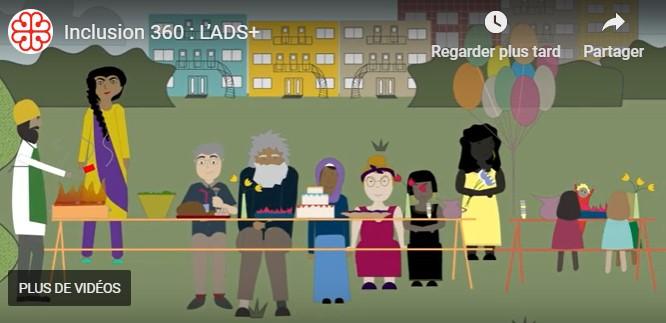
ADS+: an inclusion tool to ensure women's safety
In 2018, Montreal began its pilot approach to the application of an intersectional gender analysis (ADS+) within its policies, services and programmes. This approach allows a greater understanding of the varying forms of discrimination faced by women to discern the specific needs of the population. With this basis, programmes can then be designed with clear targets in mind in order to produce and implement optimal solutions for gender equality.
ADS+ seeks to discern the distinct effects of adopting a policy, programme and service on women and men, while taking into account other factors including social class, disability, age, ethnicity, sexual orientation and gender identity.
The city selected the intersectional practice as a preferable framework when developing an inclusive city that takes into account the daily experiences of women in public spaces, in particular those related to issues of security and sexual violence.
The City of Montreal in Canada began to participate in the UN Women Safe Cities and Safe Public Spaces Global FPI in 2019. It strengthened its commitment to ensuring the safety of women and girls in Montreal’s public spaces and to working closely with corporate services, boroughs and its institutional and community partners to achieve this goal.
Context
Since 2018, the City of Montreal has been working to implement the ADS practice in the planning of its municipal services, programmes and policies. The approach translates into pilot projects involving two boroughs and five administrative services including the Property Management and Planning Department; the Planning and Mobility Department; the Great Parks Service, Mount Royal and Sports; the Housing Department; and the Diversity and Social Inclusion Service.
Examples of Montréal pilot projects in ADS+:
- Establishment of a homeless shelter to provide emergency accommodation in winter for homeless people, with a separate and secure floor for women.
- The Place des Montréalaises: a public square between Old Montreal and the city center that commemorates Montreal women.
- Integration of inclusive consultation mechanisms in the urban development of the new Great Western Park.
- Safe changing rooms at the Rosemont Aquatic Complex.
Applied within urban planning processes, ADS allows for safe and inclusive public spaces to be designed from the outset with the particular needs of women and girls in mind in order to address inequalities. The experience of sexual violence in public spaces, including SH, is a daily issue and is likely to generate a sense of insecurity, restricting women’s rights to free movement in the city and their ability to take advantage of all opportunities.
As part of its efforts to address sexual violence, the city is leading a review of programmes from an intersectional perspective and working to support initiatives that pay particular attention to the experiences of marginalized women, including indigenous women, women with disabilities, women of sexual diversity, racialized women, women in situations of homelessness, and also with a view of women who face multiple forms of oppression. This is based in the « Leave No One Behind » principle of the Agenda 2030.
The local government of Montreal, along with its institutional and community partners, has overseen the construction of a women-only “safe space” to accommodate 50 women on one floor within a homeless shelter designed to tackle the overflow of homelessness during the winter.
Implementing “gendered urban planning” tools is not new to Montreal. In the early 2000s, through its Femmes et Ville programme, the City of Montreal developed six principles of safe urban planning for women through the Planning Guide, Pour un environnement urbain sécuritaire. The guide incorporated an intersectional approach based on women’s experiences in order to highlight that a safe city for women is a safer city for all.
New methods are added to the ADS tool within the municipality through piloted initiatives. The reflections provided by ADS will allow city partners to have a more informed view of the experiences and realities of the population, especially women, and to implement targeted interventions that adequately meet the specific needs identified.
Implementation
In order for staff to use this tool and develop the ADS approach an awareness and training strategy was held during 2019. This included: the development of concrete awareness-raising tools, the deployment of train the trainers (Tot) approach including officers or agents, and the provision of support in using ADS.
Awareness-raising tools
The first step in implementing and ensuring its success was the mobilization of municipal staff. A series of awareness-raising tools on ADS was developed and disseminated in the first year. These tools included a short video17 outlining the approach and explaining the benefits of examining the differentiated effects of an urban project on groups that may be excluded. Widely distributed to staff and partners, this video raised awareness of the importance of developing inclusive projects in the image of the Montreal population.
A guide to the application of ADS, a checklist and a deployment package have also been made available to staff to apply this analysis in the development, implementation or evaluation of their projects. The steps of application of ADS are described below with proposed questions to aid in its development.
Examples of simple questions to guide your analysis:
- Have you consulted with those who are covered by your project? (i.e. women and men in all age and income groups; non-binary, indigenous, immigrant and racialized people; those living with functional, physical or intellectual disabilities)?
- Have you consulted with groups or individuals with expertise on the issues that will be addressed?
- How does the initiative take into account the specific experiences of women, men and non-binary people?
- How does the initiative take into account the specific experiences of people from other discriminated groups (i.e. aboriginal, seniors, immigrants, racialized people, those living with functional, physical or intellectual disabilities, and those living in low-income communities)?
- What measures are specifically aimed at women, especially those from other groups experiencing discrimination?
The deployment of train the trainers' approach
The guide and tools were accompanied by a one-day training session for professionals, managers and elected officials engaged in the pilot projects. The interest in this approach has resulted in training being deployed beyond the dates of the pilot project. To date, more than 300 people have received training. Within the pilot projects, professionals received an extra day of training to play the role of multiplier agent. They carry the approach and ensure that they accompany their colleagues by referring them to the tools available or by helping to apply gender-differentiated analysis from an intersectional perspective to the initiative.
Project support
It should also be noted that, as part of this process, Montreal has benefited from the support of Relais femmes, through its provision of training, expertise and tools to support other services, allowing boroughs to incorporate this tool in practice. Thanks to its support, the Diversity and Social Inclusion Service has been able to play a stronger and more cohesive role. Specifically, Relais-femmes helped to select analysis questions, collect sex-disaggregated data, and implement inclusive consultation processes.
Lessons learned
The piloted approach within municipal initiatives and the enthusiasm it has generated among collaborators is promising. The collaboration with the Department of Urban Planning and Mobility as part of the pilot is important, as the implementation of ADS in urban planning becomes a lever to develop more inclusive public spaces and to question issues related to women’s experiences and fear of sexual violence, which are at the heart of differentiated analyses of urban spaces.
The deployment of ADS has revealed that the support and development of practical tools are essential conditions for success. The political will and openness of staff to innovate and adapt is also equally important to integrate this approach to all programmes and municipal services.
City
Owner


